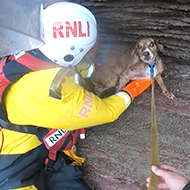
Yogi fell off a cliff and suffered serious injuries.
A spaniel has had a lucky rescue after falling 100ft down a coastal cliff while on a walk with his owner.
The Royal National Lifeboat Institution (RNLI) was called out last week when Yogi the spaniel fell over the edge of a cliff. His owner, Emily Linehan, called 999 and got the Coastguard out to help.
A volunteer crew from Torbay RNLI were sent out in the lifeboat, and quickly located Yogi, who was at the base of the cliff. He was found with injuries to his legs, eye and spine, and was wet and cold, but thankfully still alive.
Crew member Jack Hawkett collected Yogi, and carried him onto the lifeboat back to Emily.
James Hoare, lifeboat helm, said: “We’re just so glad we found him quickly as he was cold and shaking as well as injured. We wish him all the very best and the fastest possible recovery.”
Rushed straight to a veterinary practice, Yogi has a fractured spine, fractured ribs, nerve damage and an injured eye – requiring emergency surgery.
Thankfully, he has returned home, and is recovering from his ordeal.
Emily thanked the RNLI for its help: “I’m so grateful to the crew. There are no words for how I feel right now.
“I’m so impressed with how kind everyone was – all the crew were amazing. Yogi wouldn’t be here if it wasn’t for the RNLI.
“It looks like he’s going to make a full recovery and will be able to run like he could before. He’s a very lucky boy.”
In light of Yogi's traumatic ordeal, the RNLI is reminding people of its safety advice when visiting the coast with dogs; keep dogs on a lead close to cliff edges and fast flowing rivers, if your dog goes into the water or gets stuck in mud – don't go after them – move to a place that they can safely reach and call them, and call 999 or 112 and ask for the Coastguard if your dog needs assistance.
Image (C) RNLI



 The Veterinary Medicines Directorate (VMD) is inviting applications from veterinary students to attend a one-week extramural studies (EMS) placement in July 2026.
The Veterinary Medicines Directorate (VMD) is inviting applications from veterinary students to attend a one-week extramural studies (EMS) placement in July 2026.